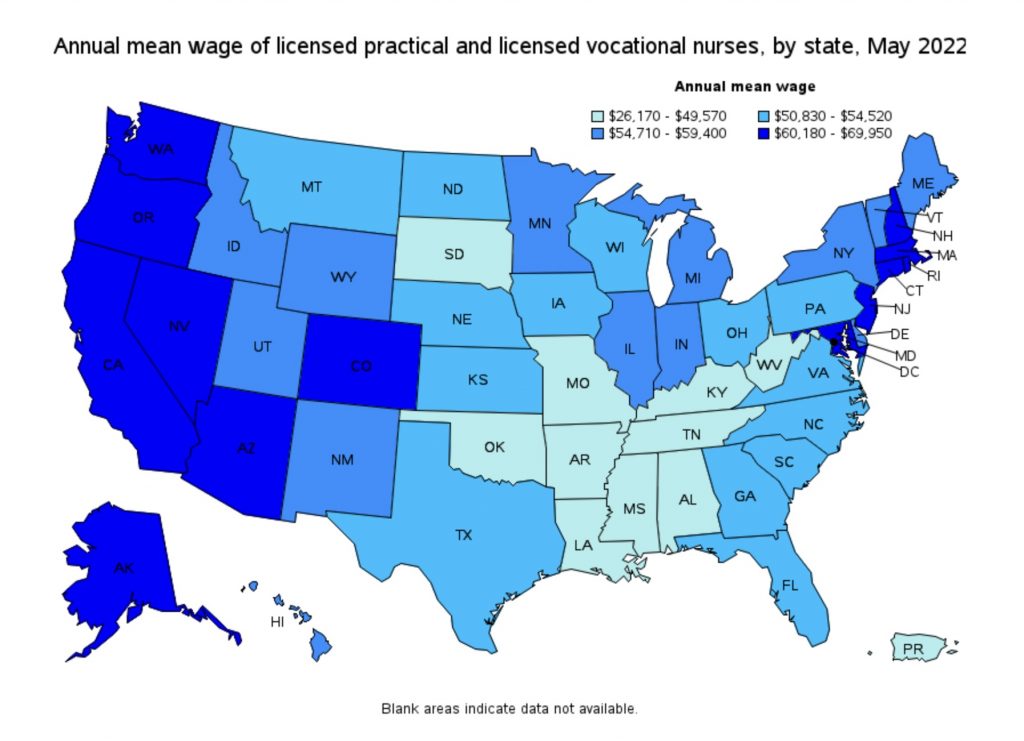Practical Nursing Program
Follow Your Passion and Become a Nurse
Request Information
Practical Nursing
PRACTICAL NURSING
The Practical Nursing Program at Sumner College can fast-track you to a new career as an LPN in just 13 months. If you are compassionate about others and want to make a difference in the field of healthcare, Sumner College may be the right choice for you.
What sets us apart? Let’s start with small class sizes, exceptional clinical opportunities, and employer partnerships that hire over 72% of our students at facilities where they complete their capstone clinical experience. Quarterly Career Fairs and our own Sumner College Medical Club allow students the opportunity to network with employers while attending school.
According to the Oregon State Board of Nursing, 47% of graduates sat for the NCLEX- PN in the state of Oregon in 2022 were Sumner College graduates.
We also provide every student in the program with a Lenovo laptop computer and the support services that foster student success. With a 97% retention rate for the current reporting year, we know what it takes to help that Dream of becoming a nurse a reality for our students.
Ready to take the next step? Download an Information Packet and contact us to set up a tour today!
Classes start every 10 weeks.
WHAT SETS US APART?
- New Term Every 10 Weeks
- 13 Month Program
- 97% Program Retention
- Over 100 Clinical Sites
- 24 Students: Average Class Size
Our Program
PRACTICAL NURSING
Sumner College is committed to providing a strong foundation for our students who are committed to excellence and prepared to begin their journey in a career that provides professional growth and advancement opportunities, while truly making a difference in people’s lives.
Our program embraces the mission of delivering high quality instruction in classroom, skills lab, and clinical settings that ensure students are equipped with the knowledge needed to contribute to the profession and the health care needs of the community.
This program allows students the opportunity to enter into a nursing program without completing prerequisite courses, and term schedules are set up by the college to assure students who complete all of the required courses can graduate in just over a year.
The Practical Nursing Program at Sumner College is approved by the Oregon State Board of Nursing (OSBN) and the Department of Education. We are authorized by the Office of Degree Authorization (ODA) to award diplomas and degrees, and accredited by the Accrediting Bureau of Health Education Schools (ABHES).
If your Dream includes advancing your practice in the future, we’ve got options for you to consider. Graduates of our Practical Nursing Program that are accepted into our Associate Degree in Nursing Program can transfer courses into this program, allowing you to start your new career as an LPN while attending school. If your educational goals include a BSN in the future, check out our RN to BSN program that is offered 100% online.
Dream It. Do It. At Sumner College.
PROGRAM INFORMATION
- Application Fee: $50
- Registration Fee: $100
- Lab and Technology Fee: $2,600
- Program Tuition: $30,578
- Graduation Fee: $40
Total Cost of Program: $33,328
Book a TEAS Exam
Career Outlook
NURSING CAREER
The field of nursing is an occupation that has continued to grow on an annual basis. According to the Bureau of Labor Statistics, employment of licensed practical nurses is projected to grow 11 percent from 2018-2028, much faster than average for all occupations. As the baby-boomer population ages, the overall need for healthcare services is expected to rise. That age demographic, in addition to many procedures that could only be done at hospital are now being down outside of hospitals, creates a demand in other settings such as outpatient care centers.
The average median starting salary of our own graduates during the 2020-2021 reporting year was $56,100.

Where Grads Work
- US Dept of Veteran’s Affairs
- Sono Bello
- Prestige Care
- Avamere
- Vibra Specialty Hospital
- Fresenius Medical Care
- Marquis Companies
- Naphcare
- Action Healthcare
- Clackamas County Corrections
- Columbia River Mental Health
- Fort Vancouver Acute Care
- Frontier Rehab & Extended Care
- The Children’s Clinic
- Vancouver Clinic
- Beacon Bill Rehabilitation
- Columbia Asthma & Allergy
- Hampton and Ashley Inn
- Brookdale Senior Living
- Regency Gresham
- Mirabella
- Washougal School District
- Cascade Park Care Center
- Trilogy Home Center
To find out more about our program, download the Program in Nursing Information kit below and reserve a seat to attend an upcoming Information Session.
13 Months to A New Career
Learn more:
Practical Nursing Program Info Packet
View OnlineWhy Sumner College
- No prerequisites required to apply
- Program designed to be completed in 13 months
- Small lab classes provide individual attention and support
- Graduates are prepared to sit for the NCLEX-PN exam
- Program starts new cohorts every 10 weeks
- Financial Aid for those who qualify
- Hands-on program promotes strong critical thinking skills
- Offering career-focused education since 1974
- 97% Program Retention -2021-2022 reporting statistics annualized
- Over 100 Clinical Sites offer a broad range of learning experiences
- College grants awarded based on academics and attendance
- Career Services Department assists in career placement after graduation

Traci F.
LPN | Charge Nurse & Preceptor
“...if somebody wants to make a career change but is hesitant, I would encourage them to GO FOR IT!”
Read Full Spotlight









New BSN Info Sessions – Register
The on-campus Information Session aims to offer valuable insights to individuals considering a Bachelor of Science in Nursing degree. Reserve a Spot…
Share at FacebookShare at TwitterShare at PinterestShare at LinkedIn
RNs ready to pursue more?
Are you a Registered Nurse wondering what the next step is in your career? Considered your BSN? Sumner College's RN to BSN program can get…
Share at FacebookShare at TwitterShare at PinterestShare at LinkedIn
Nurses Influence the Health and Wellbeing of Patients Every Day
As individuals, nurses directly influence the health and wellbeing of patients every day. Through frequent contact, nurses are best placed to encourage lifestyle changes in…
Share at FacebookShare at TwitterShare at PinterestShare at LinkedIn
Changes in Nursing
Changes in nursing involve a major shift in higher education standards, requiring more nurses to hold a 4-year bachelor of science in nursing (BSN). The…
Share at FacebookShare at TwitterShare at PinterestShare at LinkedIn
Trades make a comeback with Gen Z Workers
America’s skilled trades — from nursing and plumbing to welding to construction — need more workers as boomers retire. Gen Z-ers are stepping up to fill…
Share at FacebookShare at TwitterShare at PinterestShare at LinkedIn
Congratulations, Sumner College Graduates: Embracing New Beginnings
Congratulations to the new Sumner College nursing graduates. As the tassels are flipped and mortarboards soar into the sky, a chapter closes, and another begins.…
Share at FacebookShare at TwitterShare at PinterestShare at LinkedIn
April BSN Info Sessions
Have you considered being a nurse and working in the healthcare industry? Attend an information meeting with Sumner College to learn more about the BSN…
Share at FacebookShare at TwitterShare at PinterestShare at LinkedIn
The State of Wellness: Everything You Need to Know About the Oregon State Board of Nursing
You have likely heard about the Oregon State Board of Nursing (OSBN), but how does the organization interact with and support Oregon nurses? Join us…
Share at FacebookShare at TwitterShare at PinterestShare at LinkedIn
OCN Explores Nursing Wages in New Research
Article & Photo Shared from Oregon Center for Nursing How much do Oregon nurses really make? The well-being of Oregon’s nursing workforce is a guiding initiative for…
Share at FacebookShare at TwitterShare at PinterestShare at LinkedIn
New Classes Start Today!
March classes start today! Welcome to our new BSN, PN and RN-BSN students.…
Share at FacebookShare at TwitterShare at PinterestShare at LinkedIn
Meet Alex – Sumner College Graduate
Alex, congratulations on your graduation! As you’ve embarked on your nursing journey, remember: ‘Nursing is not just a profession, it’s a calling to serve, heal,…
Share at FacebookShare at TwitterShare at PinterestShare at LinkedIn
Meet Alexandra – Sumner College RN to BSN Graduate
Alexandra, congratulations on your graduation! As you’ve embarked on your nursing journey, remember: ‘Nursing is not just a profession, it’s a calling to serve, heal,…
Share at FacebookShare at TwitterShare at PinterestShare at LinkedIn
Meet Renee – Sumner College Graduate
Renee, congratulations on your graduation! As you’ve embarked on your nursing journey, remember: ‘Nursing is not just a profession, it’s a calling to serve, heal,…
Share at FacebookShare at TwitterShare at PinterestShare at LinkedIn
Meet Serena – Sumner College Graduate
Serena congratulations on your graduation! As you’ve embarked on your nursing journey, remember: ‘Nursing is not just a profession, it’s a calling to serve, heal,…
Share at FacebookShare at TwitterShare at PinterestShare at LinkedIn
Meet Amanda – Sumner College Graduate
Amanda, congratulations on your graduation! As you’ve embarked on your nursing journey, remember: ‘Nursing is not just a profession, it’s a calling to serve, heal,…
Share at FacebookShare at TwitterShare at PinterestShare at LinkedIn
Meet Natalie – Sumner College Graduate
Natalie, congratulations on your graduation! As you’ve embarked on your nursing journey, remember: ‘Nursing is not just a profession, it’s a calling to serve, heal,…
Share at FacebookShare at TwitterShare at PinterestShare at LinkedIn
Now Hiring
Are you a healthcare educator? Sumner College is looking for our next Nursing Educator to join our team. This is a part time position. Read…
Share at FacebookShare at TwitterShare at PinterestShare at LinkedIn
Meet Erin – Sumner College Graduate
Erin, congratulations on your graduation! As you’ve embarked on your nursing journey, remember: ‘Nursing is not just a profession, it’s a calling to serve, heal,…
Share at FacebookShare at TwitterShare at PinterestShare at LinkedIn
Exploring the Vital Role of Nurses in Heart Health
Article Shared from DiversityNursing.com February is American Heart Month. It's important to promote cardiovascular health and explore the many ways Nurses are engaged in these…
Share at FacebookShare at TwitterShare at PinterestShare at LinkedIn
Meet Anne Marie – Sumner College Graduate
Anne Marie, congratulations on your graduation! As you've embarked on your nursing journey, remember: 'Nursing is not just a profession, it's a calling to serve,…
Share at FacebookShare at TwitterShare at PinterestShare at LinkedIn
Nursing Ranked Most Trusted Profession for 22nd Year
Article Shared from DiversityNursing.com In Gallup's 2023 Honesty and Ethics poll, Americans' evaluations of almost all 23 professions have experienced a decline compared to previous years.…
Share at FacebookShare at TwitterShare at PinterestShare at LinkedIn
Helpful Apps Every Nurse Should Have
Article shared from DiversityNursing.com Mobile apps have transformed how Nurses provide care to their patients. Smartphones allow Nurses easy access to applications designed to assist…
Share at FacebookShare at TwitterShare at PinterestShare at LinkedIn
DiversityNursing.com – Helpful Resources
Helpful Resources DiversityNursing.com is a Career Job Board, Community and Information Resource for all Nurses regardless of age, race, gender identity, religion, education, national origin,…
Share at FacebookShare at TwitterShare at PinterestShare at LinkedIn
How to Prepare for College – Oregon Goes to School
Article shared from Oregon Goes to College It’s a plan! No matter what grade you’re in, you can get ready for your future. Getting ready…
Share at FacebookShare at TwitterShare at PinterestShare at LinkedIn
Sumner College Clinical Partners
Sumner College clinical partnerships play a crucial role in advancing medical education and training. By offering opportunities for hands-on experience and mentorship, these collaborations help…
Share at FacebookShare at TwitterShare at PinterestShare at LinkedIn
Commencement Ceremony
Save the date - April 6, 2024 for Sumner College's Commencement Ceremony. Celebrating cohorts: PN54, PN55, ADN23, RN-BSN10 and RN-BSN11 Congratulations to you all!! Tickets…
Share at FacebookShare at TwitterShare at PinterestShare at LinkedIn
Healthcare Hero
Are you aspiring to be a healthcare hero? A common question from our nursing students at Sumner College is about the role of ER nurses…
Share at FacebookShare at TwitterShare at PinterestShare at LinkedIn
Dynamic – Interactive – Rich with Real-world Relevance
RNs are you ready to take your nursing career to the next level with a BSN? Guess what - at Sumner College, you can achieve…
Share at FacebookShare at TwitterShare at PinterestShare at LinkedIn
ER Nursing
Have you been thinking, “How can I start my nursing career in an ER?" Begin by obtaining a solid understanding of nursing through an approved…
Share at FacebookShare at TwitterShare at PinterestShare at LinkedIn
LPN
At Sumner College, we understand the importance of every role in the nursing field, including the dedicated work of Licensed Practical Nurses (LPNs). LPNs are…
Share at FacebookShare at TwitterShare at PinterestShare at LinkedIn